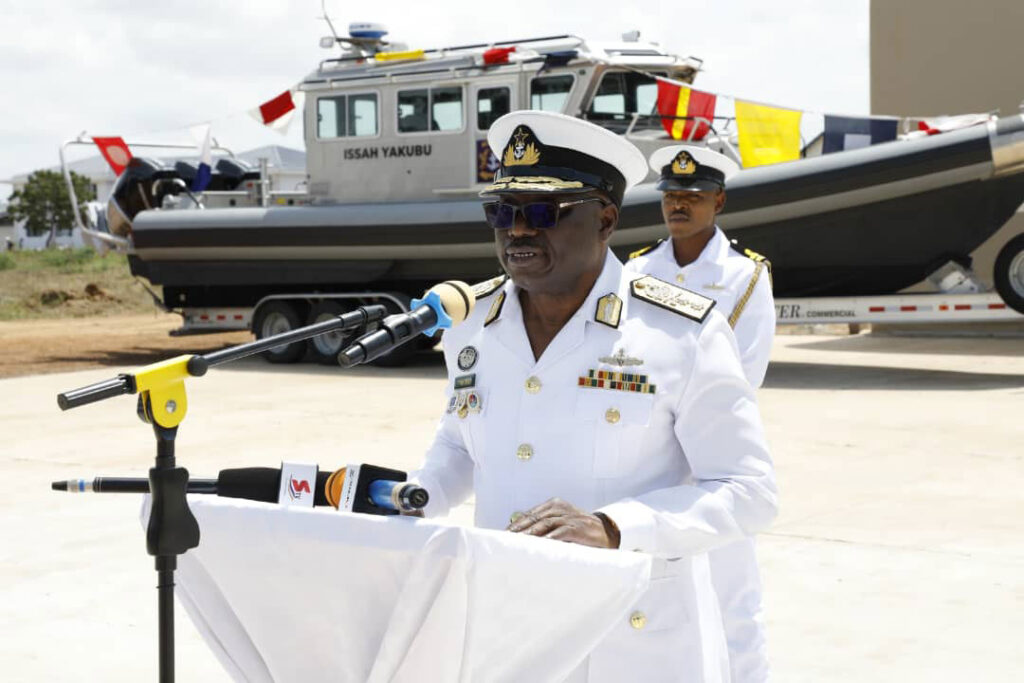ADF STAFF
The Ghana Navy in September received two Defender patrol boats that will enhance its capacity to combat illegal, unreported and unregulated (IUU) fishing, drug trafficking, arms smuggling, piracy, armed robbery at sea and other maritime crimes.
The U.S. government donated the boats and also provided a storage facility. The donation was worth more than GHC24 million ($1.5 million). The U.S. also gave Ghana two Defender boats last year.
During a handover ceremony at the Naval Training Command (NAVTRAC) in Ghana’s Volta Region, Chief of the Naval Staff, Rear Adm. Issah Adam Yakubu thanked the U.S. for providing the four 38-foot boats as well as communications tools, weapons, ammunition, and visit, board, search and seizure equipment.
Commodore Solomon Asiedu-Larbi, the flag officer commanding NAVTRAC, also expressed gratitude for members of the U.S. Navy and U.S. Marines who helped build the storage facility.
U.S. Ambassador to Ghana Virginia Palmer said she was proud of the countries’ longstanding partnership, saying it is based on mutual commitments to security, democracy and prosperity.
“This ceremony is more than just a handover,” Palmer said. “It symbolizes our joint efforts to ensure the Ghana Navy is well-equipped to safeguard its waters.”
Illegal fishing, mostly by large, industrial Chinese trawlers, has plagued Ghana and other West African countries for decades. The practice decimates fish stocks and ratchets up the price of seafood. In Ghana, small pelagic fish populations such as sardinella have dropped 80% in the past two decades, according to the Environmental Justice Foundation. One species, sardinella aurita, is fully collapsed.
“The catch has declined drastically,” Kofi Tawia, a 40-year-old artisanal fisherman in the port of Cape Coast, told The Guardian newspaper. Tawia is one of the more than 100,000 fishermen operating in the country, where the average annual income has dropped by as much as 40% per artisanal canoe in the past 15 years or so, according to the foundation. The decimated fish stocks cause prices to soar and drive food insecurity.
Tawia said there are so few fish that negotiations over how to share the day’s catch can easily lead to physical altercations. The situation is similar around West Africa, now considered the world’s epicenter for illegal fishing, where local governments are losing an estimated $10 billion per year, according to a September 2023 report by the Stimson Center.
Piracy in West Africa is also on the rise. Over the last year, pirates, armed robbers and kidnapping-for-ransom groups have operated off Nigeria, Cameroon, Equatorial Guinea, Ghana, Nigeria and Togo. They targeted a variety of vessels including tankers, container ships, general cargo vessels and passenger vessels, according to the U.S. Department of Transportation. These criminals have attacked and boarded vessels up to 300 nautical miles from shore, and they are known to fire upon ships during boardings and attempted boardings.
There were 22 piracy attacks in the Gulf of Guinea in 2023, up slightly from 19 in 2022, but down from 35 in 2021 and 81 in 2020, according to the International Maritime Bureau. Officials reported six piracy incidents in the first quarter of 2024 compared to five in the same period of 2023.
These threats to Ghana’s blue economy led to the 2022 formation of its National Integrated Maritime Strategy, which aims to ensure that Ghana’s maritime domain will be safe by 2040.
The goal is to strengthen Ghana’s framework of maritime governance; ensure the security of its maritime domain; protect the marine environment; promote research, awareness and knowledge-sharing; and develop regional and international cooperation, according to a report by Ghana Web.
Godred Sowah Khartey, a fellow at CEMLAWS Africa, which promotes maritime security, said he believes the strategy will effectively address sea crimes and help improve the livelihoods of Ghana’s coastal communities.

